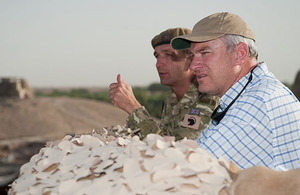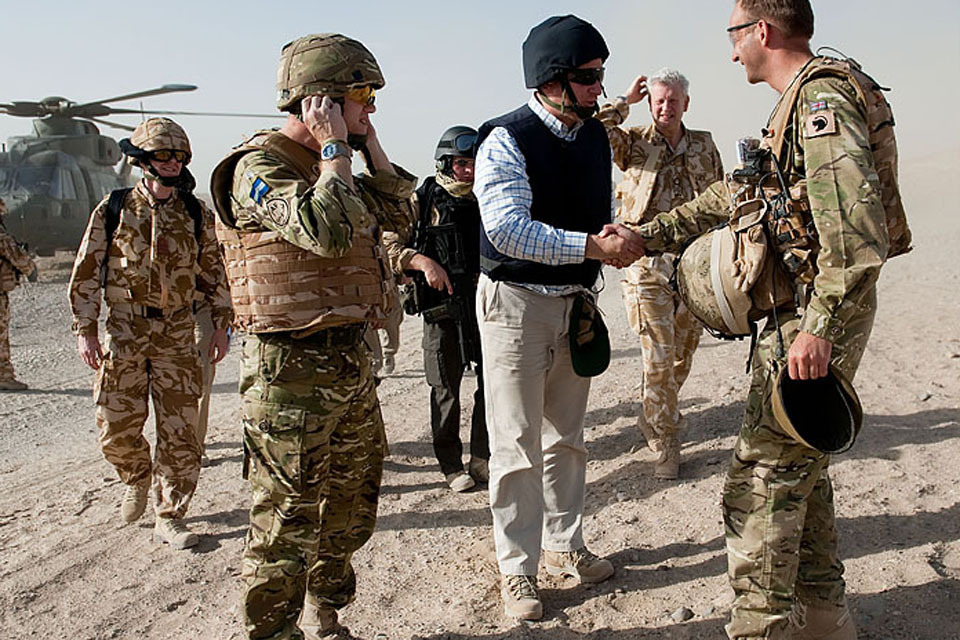Armed Forces Minister on covenant, kit and commitment
Recently back from a visit to southern Afghanistan, Armed Forces Minister Nick Harvey speaks about his commitment to those in uniform

Nick Harvey surveys the area of operations during his recent visit to Helmand province [Picture: Corporal Gary Kendall, Crown Copyright/MOD 2010]
We are a bit early, the photographer and I. We are waiting outside the new Armed Forces Minister’s office on the fifth floor of MOD’s Main Building. It doesn’t hurt to make a good first impression:
He won’t be long,” his Private Secretary (PS) tells us. “He’s talking to the person standing in for Commander-in-Chief Air Command [Air Chief Marshal Sir Christopher Moran tragically died recently competing in a triathlon at RAF Brize Norton], they’ve probably got a lot to discuss.
The PS discretely signals through the glass panel that the Minister’s next diary date has arrived:
He’s a nice chap, very easy to talk to, very relaxed,” he tells us.
Then, clutching a cup of tea - but no biscuit - in we go, to find out for ourselves.
Sitting in shirtsleeves and quietly spoken, Nick Harvey starts by telling me about his priorities:
There’s no two ways about it, Afghanistan is the top priority and the Strategic Defence and Security Review is second.
As part of all that, I think that from where I’m sitting as Armed Forces Minister, restoring the military covenant and repairing the perceived breach of it is my particular bag.
Until now the military covenant has been an unwritten understanding between the state and its Armed Forces.
Essentially, in return for giving up a lot of freedoms and taking a huge amount of personal risk, troops can expect to be looked after in terms of physical and mental health, and for they and their families to be adequately housed.
With the tempo of operations in Iraq and in Afghanistan, and the speed with which we have had to tool-up and do this, some of these covenant issues have been left behind.
It is not news that the new government’s objective is to formalise the covenant, codify it and write it down. But Mr Harvey says he is taking it even further:
We will formalise it by making it a part of the Strategic Defence and Security Review [SDSR], and we intend to review this every parliament. Each time we do that, we will assess what changes we need to make to give better effect.
As the Minister says this, he anticipates my next question:
Of course we have to see this in the context of yesterday’s [22 June’s] emergency budget announcement. It is very much the art of the possible, but it will be seen as a very clear priority.
Doubling the Operational Allowance for Service personnel is evidence that this approach is being backed up with hard cash:
There’s been a lot done to improve accommodation,” adds the Minister. “But there are still a lot of problems. We are seeing a shift towards less movement in careers.
It may be that we need to give more priority to enabling Service personnel and their families to settle in particular areas and buy their own homes, with some assistance where possible.
Mr Harvey has just returned from a whistlestop tour of Afghanistan. His last was two years ago when he was on the opposition benches:
I think we clocked up nine hours’ sleep in four days,” he recalls. “I rather lost track of time.
Since the Americans came to town, Camp Bastion has grown and changed out of all recognition, a sign that, Mr Harvey reckons, tells a tale:
I’m sure that the Brits are pleased to be reinforced with a large contingent of allies, and you’ve got to realise that the number of Afghan forces has increased exponentially as well. Together it all makes a huge difference, giving us a better chance of accomplishing our mission in Helmand.
The most impressive thing during my visit was how absolutely everybody we saw, from Generals right down to a 19-year-old Scots Guard on a checkpoint, all completely bought into the mission.

Armed Forces Minister Nick Harvey meets British troops in Helmand province, southern Afghanistan [Picture: Corporal Gary Kendall, Crown Copyright/MOD 2010]
So the commitment might be there, but is there evidence to indicate that the can-do attitude is making a difference?
The proportion of the country that is now broadly in harmony with the emerging organs of the state is considerably higher than it was,” says the Minister.
In Helmand, which is generally considered to be the most difficult of the provinces, it is reckoned that 11 out of 14 districts are loyal to the [Afghan] Government. Insurgency carries on of course, but the number of no-go areas are much diminished.
Mr Harvey believes that this beneficial influence is spreading as the credibility of the state is proven, and he links that success with the growing capability of the Afghan forces, and increasingly the Afghan police, to deliver security in the area. Belief in the state is also thanks in no small part to Helmand’s Governor Mangal:
By popular acclaim he is doing an outstanding job,” says Mr Harvey. “He has high credibility with the international community, and, as far as I can see, within Helmand too. He has also been appointing a number of new district governors, the calibre of which I think is improving all the time.
My sense is that tribal elders and other opinion-formers are pretty supportive.
Back in the UK, there still seems to be a large contingent of the public who need convincing of the need to be in Helmand, and complaints about ‘inadequate kit’ still appear in the tabloids. What is the Minister’s take on this?
We have to keep hammering the same themes and messages,” he says. “We are there for the protection of our national security. We went into Afghanistan because it had been the HQ for international terrorist outrages and we can only leave when we can be confident that we won’t leave a void into which they can return.
Mr Harvey feels that it does not help when elements of the media take the number of British casualties as the only measure of success:
It is a horrible part of the picture of course, but to suggest that it’s the only, or even the principal, yardstick of progress is absurd. Even in Sangin, where we are taking some very heavy casualties, this is reflective of the tempo of the battle stepping up and the fact that we are taking the battle to the insurgents and pushing them back.
And what about kit?
It wasn’t raised with me in theatre when I was there. I kept giving people the opportunity to raise it, and they didn’t - although they were only too willing to do so two years ago. I think things have improved a lot.
Of course we could always do with more. More protective vehicles are on the way, and we have announced an extra £67m to be spent on countering IEDs. It’s important to realise that detection of IEDs is getting a lot better. We tend to find four for every one that explodes.
The fact that so many IEDs are being frustrated is a sign of progress. The public only tend to hear about the ones that go off, and not all of those either, as the victims often are poor Afghan children.
Perhaps, in today’s financially-tight circumstances, the public might feel happier if the burden was being shared more fairly across NATO coalition forces?
Obviously we would like to see other NATO countries sending in more troops, but let’s just reflect. When there was an agreement that NATO numbers should go up, quite a lot of NATO countries did commit, and they are beginning to send troops. Maybe not in the same numbers that the Americans are, but they are going in. The Dutch and the Canadians, for example, have made massive contributions.
Some countries are restricted by their constitutions, but I think we just have to accept that different NATO countries contribute in different ways. And if they feel they have exhausted themselves for the time being, one has just got to respect that and appreciate what they have done.
There are times when you have to feel a bit of sympathy for Members of Parliament. For example, moving from the shadows and into government, suddenly being responsible for things you were only having to comment on weeks before:
That is a culture shock,” acknowledges the Minister. “But having had responsibility for the same area, I arrived with background knowledge. However it is a steep learning curve.
The quietly-spoken man does not shy away from ending with a hard line:
In terms of the budget, I can see that things are worse than I feared, and the headache of making everything balance within the framework of the SDSR is logical.
There are some home truths that have to be told.